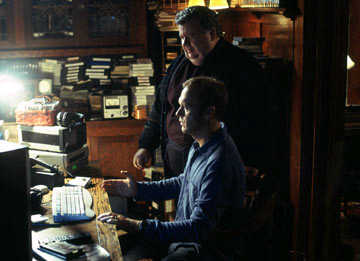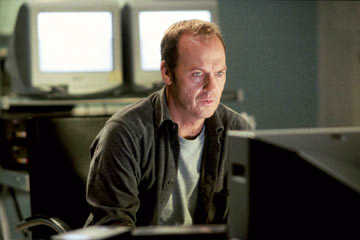

People with insomnia can sometimes use white noise to help them go to sleep. Now it seems they can also use White Noise to get to the same result. This is the first wide release of 2005, and like most other years, the first release is a stinker. The plot of White Noise revolves around the concept of Electronic Voice Phenomenon (EVP), where the dead contact the living through the static in radio or television transmissions. It's an interesting idea, utterly ruined in this moronic, by-the-numbers horror movie. It's a real shame for Michael Keaton, who has stayed out of the spotlight in recent years. If Keaton (Live from Baghdad) keeps up with films like this and Chasing Liberty, then he really needs to take a second look at the scripts he is reading.
Keaton is Jonathan Rivers, a successful architect who lives with his second wife Anna (Chandra West, Winter's Edge, The Salton Sea), a successful author, and his son from his first marriage. The Rivers' are blissfully happy, and Anna just discovered she was pregnant. This is too perfect, which means that Anna will die. She disappears, leaving only her empty car at the side of the river. This throws Rivers into a deep depression, and it takes him nearly half a year to recover. By this time, authorities discovered her body, and Rivers tried to move on with his life. All of a sudden, he begins receiving phone calls from Anna's cell, hearing strange things in static, and feeling generally creeped out. Raymond Price (Ian McNeice, Bridget Jones: The Edge of Reason, Around the World in 80 Days) tells him that Anna is trying to communicate from beyond.
Price practices EVP, and an initially skeptical Rivers jumps at the opportunity to talk to Anna again. He basically abandons his normal life to record and analyze static, looking for even the slightest hint that Anna is trying to tell him something. It is at this point that director Geoffrey Sax and screenwriter Niall Johnson (The Big Swap) take things off the deep edge. Anna is not the only one trying to communicate. Rivers meticulously analyzes everything he hears, and soon realizes that some of the messages are from people still alive, and that he has the power to prevent their deaths. He also is dogged by a trio of formless, menacing voices. Sax succeeds in changing the story from a man dealing with the possible reappearance of his wife to a lame horror movie.
However, to get to this point, one needs to sit through nearly forty minutes of nothing. There is too much time spent on setting up the plot, only to have everything else happen too quickly. In a short amount of time, Rivers goes from grieving widower to superhero. There is no real logic to how or why this happens, and the script does a shoddy job of tying things together in the end. The ending is a real let down, because it leaves gaping holes in the plot and fails to explain many things. Why is Anna doing what she is doing? How come nothing bad ever happened to Price after years of EVP? Doesn't Rivers realize he has a son anymore? Worse, Sax uses cheap shots to make people jump instead of creating a scary mood. He then telegraphs every scene with a loud, intrusive score. Sax is doing everything possible to try to trick viewers into thinking this is a horror film. Well, it's not.